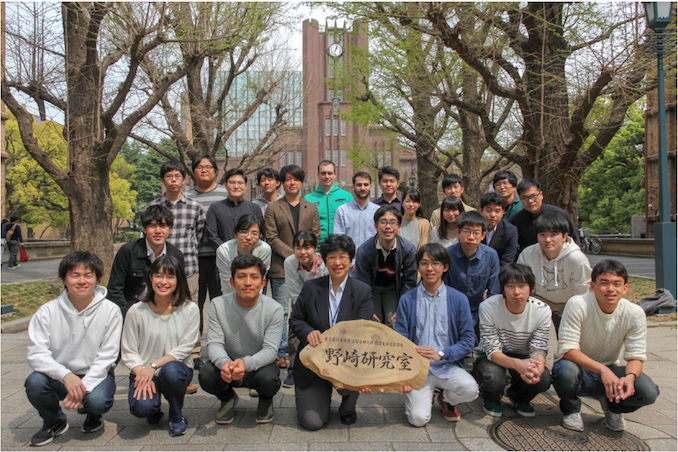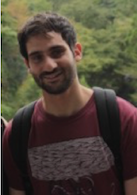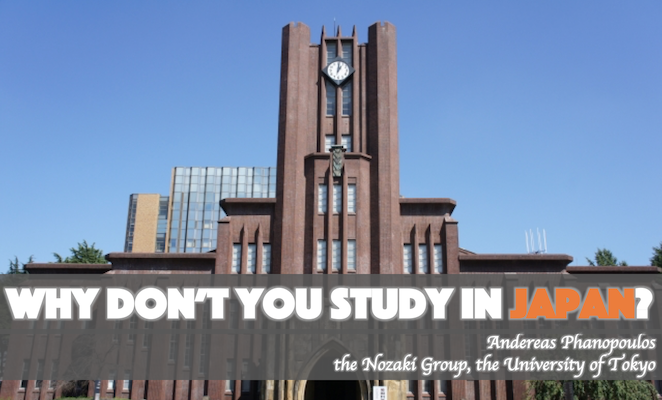“The country (Japan) has a rich culture with a depth of new things to learn and experience.” Dr. Andreas Phanopoulos, a postdoctoral chemist working for the Nozaki Group at the University of Tokyo, speaks with Chem-Station and shares what he thinks about life in Japan.
Although the exceptional chemical research done in Japan may promote Japan as a potential place to study chemistry, the language barrier can be a limiting factor for researchers seeking to go there. “People who are thinking of coming to Japan shouldn’t worry too much about the language or culture shock, it’s not unsurmountable, and everyone is so friendly,” said Dr. Phanopoulos.
What is it like to study in Japan? What are the advantages and disadvantages? Check it out, and you will find the Dr. Phanopoulos’ experience exciting.
1. Please tell us about your research in Japan.
My original research proposal for my JSPS fellowship was to examine tandem hydroformylation–hydrogenation catalysts, capable of directly converting olefins into linear alcohols; but as always seems to happen with research, we decided to explore some unexpected results along the way. Specifically, we observed some unusual regioselectivities during the hydroformylation reaction, which produced rarely observed branched aldehydes instead of the expected linear analogues. This work has been published in ACS Catalysis[1].
The catalysts I’ve been studying are rhodium complexes with nitrogen-centered triphosphine ligands. These ligands are synthesized in a modular fashion that makes them easy to alter, and they are underdeveloped compared to other triphosphines. Additionally, they show some unique electronic properties due to the central nitrogen, which makes them very attractive for future catalytic studies. The branched aldehydes that this catalyst system is capable of producing are becoming increasingly important in the fragrance and flavour, and life-sciences industries, as well as being important intermediates in organic synthesis.
Unexpected selectivity observed during hydroformylation reactions.
2. Why did you decide to study in Japan?
I’ve been fascinated with Japan for many years. At first, I didn’t know that much about the science being carried out in Japan, instead I was interested in other aspects of social life and the culture. My interest in Japan probably started when I first watched the movie Lost in Translation, about two people who meet each other in a hotel in Tokyo. I liked the movie so much that I started doing more research on my own into Japanese life. The first thing I did was listen to lots of different Japanese music, from traditional shamisen music, to J-pop like Kyary–Pamyu Pamyu (きゃりーぱみゅぱみゅ) and alternative bands like Uchu Konbini (宇宙コンビニ). I also read a lot about Japanese culture, from old traditions like onsen baths and temples, all the way to new trends like Harajuku fashion and otaku culture. I really like how Japan has managed to hold on to its ancient traditions, while somehow being super modern at the same time, it makes it such an interesting country!
After my PhD I was looking for possible post-docs and fellowships, and that’s when I seriously started considering working in Japan. One of my professors mentioned the JSPS fellowship as an option for carrying out research in Japan, so I started looking into potential groups. It was then that I was properly exposed to all the exceptional chemical research that comes from Japan. Although I found several potential groups that are active in exciting areas, I ultimately applied to join the Nozaki laboratory, as the catalytic research they report is world-leading, and everyone I spoke to in the UK said Prof. Nozaki is an amazing PI to work for!

The Nozaki Group at Tokyo University.
3. Are there any positive things about your life in Japan? What about negative things?
Japan is an amazing place to live. The country itself has so many different aspects and I’ve immensely enjoyed my time here. It’s almost unbelievable that you can go skiing in Hokkaido, mountain climbing in Yamanashi and scuba-diving in Okinawa without ever leaving the country! The food here is delicious as well. There is so much variety and I love trying all the different delicacies from each prefecture.

Snowboarding in Sapporo (left), on the top of Mt. Fuji at sunrise (middle) and scuba diving in Okinawa (right), without ever leaving Japan!
My research life here is also fantastic, everyone is always interested in what you are doing and are ready to discuss any problems you may have. The facilities in the group are exceptional, I never thought I would have access to so many instruments. Not only are all the machines modern and well-maintained, but because there are several different areas of research being conducted within the lab, the variety is amazing as well. This is actually another big benefit from my time spent in the Nozaki laboratory, the scope and depth of different research being carried out has allowed me to gain a better understanding of areas of chemistry I wasn’t very knowledgeable in. The Nozaki lab is very hard working, but they also love to celebrate together and relax, any excuse for a party! There are always loads of events like hot-pot parties, birthdays and the annual lab trip to look forward to!

The annual Nozaki/Sando group BBQ (left) and Prof. Nozaki leading the first cheers (乾杯) at the annual Nozaki lab trip (right).
There are hardly any negative things! Japanese people do tend to work longer than in European universities, so at first I felt quite tired by the time I got home at night. This is well-known about Japanese culture, however, and you quickly get used to it. Earthquakes are a bit scary when you first get here but you soon get used to these as well. Typhoons can also be both positive or negative experiences, it depends whether you’re outside or not! In general I find the weather in Japan much more enjoyable that in northern Europe, where I did my undergraduate and PhD studies. Japan has proper defined seasons, not just the same mild, grey, rainy weather that the UK seems to have perpetually!
4. Did you have anything to worry about before coming to Japan? If you did, what did you do to prepare for it?
Most of the logistical details were taken care of by the JSPS as part of my fellowship, so there wasn’t too much to worry about – I would strongly recommend this fellowship for anyone wanting to try and do a post-doc in Japan. The one thing I was worried about was the potential language barrier. For about six months before I arrived, I learnt the meanings of >2000 kanji, which was a great help at the beginning. Since arriving I’ve been taking language classes, and now I feel comfortable in most situations, but I doubt I’ll be writing any reports in Japanese! People who are thinking of coming to Japan shouldn’t worry too much about the language or culture shock, it’s not unsurmountable, and everyone is so friendly and willing to help that even going to the ward office or estate agents can be done with minimal understanding!
5. Please share difficulties you have faced.
The most difficult thing was getting set-up with an apartment. In order to get an apartment, you first need a Japanese bank account, for which you need a Japanese telephone number, but before you can get a telephone number you need to register your residence card with an address! It was a bit of a Catch-22 but luckily the estate agent was able to convince the landlord to rent me an apartment without a bank account. Another issue is that almost all apartments in Japan come without furniture, so this means you will need to buy everything, including a fridge, washing machine etc., plus many don’t have ovens, which Europeans will definitely be expecting. There are some excellent furniture shops in Japan though, where you can buy good furniture for relatively cheap, so you can get everything you need without going bankrupt! Personally, I found Nitori (ニトリ) to be the most useful shop, plus they usually have staff who can speak English fluently, useful if you want to organise deliveries of the bigger items. Alternatively, there is a big overseas community who often sell most of their furniture cheaply in one bundle if they are planning on leaving the country, this could be a convenient and cheap way to get most of what you need in one go.
I suppose most of the difficulties people would encounter would be when you first arrive. Japan can seem intimidating if you’re not prepared for it. I was fortunate to move here with my fiancé, so any difficulties we could face together, which made everything more manageable. If you are planning on moving to Japan I would suggest trying to find other foreigners who live near-by or are coming at the same time, so that you can help each other out.

Me and Charlotte (my fiancé), excited after having just arrived in Tokyo together.
6. What is next? How are you going to use what you have experienced and learned in Japan?
Hopefully I’ll be heading back to find a position in Europe (not entirely sure where yet though!) I’ll certainly be using all the knowledge and skills I have learned in Japan. The research I have carried out here has taught me to be much more independent, having to use all the equipment yourself rather than relying on technicians forces you to really understand how the instruments work. Plus, having some of the instrument interfaces only available in Japanese means you have to be doubly sure what everything does, I now feel confident in learning how to use any new instrument I encounter!
When I move back I will encourage everyone I can to come and visit Japan, even if it is only for a short time, I’m sure I will certainly be coming back whenever possible! I also feel like I’ve made some good progress learning how to speak Japanese, so hopefully I’ll keep going to lessons when I leave and maybe I’ll be able to take another language proficiency test.
7. Please leave a message for the readers.
Everyone should come and study/work in Japan! The country has a rich culture with a depth of new things to learn and experience, 行きましょう、遊びに来てください!
[References]
[1] Phanopoulos, A.; Nozaki, K. ACS Catal. 2018, DOI: 10.1021/acscatal.8b00566
[Profile]

Name:
Andreas Phanopoulos
Education:
PhD (Imperial College London, 2011–2015)
MChem (Durham University, 2007–2011)
[amazonjs asin=”B01ENC2BD4″ locale=”JP” title=”KPP BEST”]
[amazonjs asin=”B0001I1K32″ locale=”JP” title=”Lost in Translation”]
[amazonjs asin=”B07CQY21HC” locale=”JP” title=”Japan Travel Guide: Things I Wish I’D Known Before Going To Japan (The Everything Nippon Travel Guide Series) (English Edition)”]


